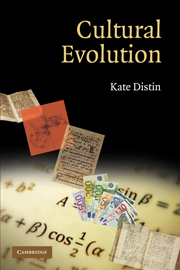Book contents
- Frontmatter
- Contents
- Cultural Evolution
- 1 Introduction
- PART I THE INHERITANCE OF CULTURAL INFORMATION
- PART II THE INHERITANCE OF CULTURAL INFORMATION
- PART III THE INHERITANCE OF CULTURAL INFORMATION
- 7 How Did Artefactual Language Evolve?
- 8 Artefactual Language, Representation and Culture
- 9 Money
- 10 Money
- PART IV THE RECEIVERS OF CULTURAL INFORMATION
- PART V THE EXPRESSION OF CULTURAL INFORMATION
- 14 Conclusion
- Appendix
- Acknowledgements
- Bibliography
- Index
10 - Money
The Explanatory Power of Artefactual Languages
Published online by Cambridge University Press: 05 June 2012
- Frontmatter
- Contents
- Cultural Evolution
- 1 Introduction
- PART I THE INHERITANCE OF CULTURAL INFORMATION
- PART II THE INHERITANCE OF CULTURAL INFORMATION
- PART III THE INHERITANCE OF CULTURAL INFORMATION
- 7 How Did Artefactual Language Evolve?
- 8 Artefactual Language, Representation and Culture
- 9 Money
- 10 Money
- PART IV THE RECEIVERS OF CULTURAL INFORMATION
- PART V THE EXPRESSION OF CULTURAL INFORMATION
- 14 Conclusion
- Appendix
- Acknowledgements
- Bibliography
- Index
Summary
Culturally acquired competence in an artefactual language provides access not only to the content that is represented in that language but also to functional cooperation with other people who are competent in its use. Such access, or conversely, exclusion, can have implications for individuals' social status and hence for their biological fitness. In this chapter, I show how a representational account of money has several explanatory advantages over alternative views of money and is also supported – rather surprisingly – by evidence from the Eurovision Song Contest. A representational view of money enables us to understand the connections between health, wealth and other measures of social status. By providing or preventing access to cooperation with people from social groups other than our own, culturally evolved artefactual languages can have an impact on our biological fitness – but this should not mislead us into thinking that they are therefore the product of biological evolution. The theory of evolution has revolutionised and unified our understanding of the natural world, and it can do the same for human culture – but only if we are careful to focus on evolution in the appropriate realm. The advantage of a representational theory of money is that it draws monetary phenomena under the same explanatory umbrella as every other aspect of culture: as the product of evolved cultural information, discretely represented in evolved cultural languages, which are realized in evolved cultural media.
- Type
- Chapter
- Information
- Cultural Evolution , pp. 146 - 166Publisher: Cambridge University PressPrint publication year: 2010



